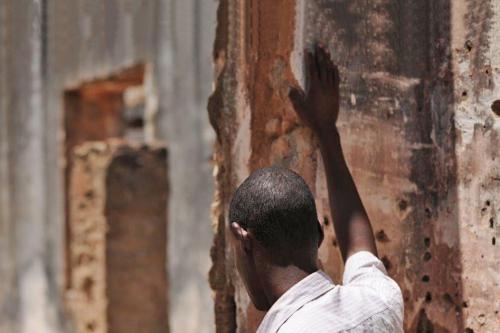Marginalization, perceived abuse of power pushing Africa’s youth to extremism – UN study
Deprivation, marginalization and perceived state violence or abuse of power are pushing young Africans into the clutches of violent extremism, a groundbreaking study by the United Nations Development Programme (UNDP) reveals.

A former Al-Shabab fighter at a rehabilitation centre in Baidoa.
Government action the ‘tipping point’
In one of the study’s most striking findings, 71 per cent of recruits interviewed said that it was some form of government action that was the ‘tipping point’ that triggered their final decision to join an extremist group.
The actions cited most often were killing or arrest of a family member or friend.
Against this backdrop, the study urges governments to reassess militarized responses to extremism in the light of respect for the rule of law and human rights commitments. It also highlights the importance of focusing on development in addressing security challenges.
“Delivering services, strengthening institutions, creating pathways to economic empowerment – these are development issues,” Mr. Dieye added.
Another key recommendation calls for local-level interventions, such as supporting community-led initiatives building social cohesion, as well as amplifying the voices of local religious leaders who advocate tolerance.
However, it cautions that these initiatives must be spearheaded by trusted local actors.
Key findings
Based on responses to questions including on family circumstances, childhood and education, religious ideologies, economic factors, state and citizenship, the study also finds that:
◾Majority of recruits come from borderlands or peripheral areas that have suffered longstanding marginalization and report having had less parental involvement growing up.
◾Most recruits expressed frustration at their economic conditions – with employment the most acute need at the time of joining – as well as a deep sense of grievance towards government: 83 per cent believe that government looks after only the interests of a few, and over three-fourths said they have no trust in politicians or in the state security apparatus.
◾Recruitment in Africa occurs mostly at the local, person-to-person level, rather than online, as is the case in other regions – a factor that may alter the forms and patterns of recruitment as connectivity improves.
◾Some 80 per cent of recruits interviewed joined within a year of introduction to the violent extremist group – and nearly half of these joined within just one month.
◾In terms of exiting a violent extremist group, most interviewees who surrendered or sought amnesty did so after losing confidence in the ideology, leadership or actions of their group.
The report is based on a two-year, in-depth study, including interviews with some 495 voluntary recruits who joined Africa’s most prominent extremist groups, including Boko Haram and Al-Shabaab.
According to UNDP estimates, some 33,300 people in Africa have lost their lives to violent extremist attacks between 2011 and early 2016.
Violence perpetrated by the Boko Haram terrorist group alone has resulted in the deaths of at least 17,000 people and displaced millions in the Lake Chad region.
Source:United Nations
- 259 reads
Human Rights
Ringing FOWPAL’s Peace Bell for the World:Nobel Peace Prize Laureates’ Visions and Actions

Protecting the World’s Cultural Diversity for a Sustainable Future

The Peace Bell Resonates at the 27th Eurasian Economic Summit

Declaration of World Day of the Power of Hope Endorsed by People in 158 Nations

Puppet Show I International Friendship Day 2020

